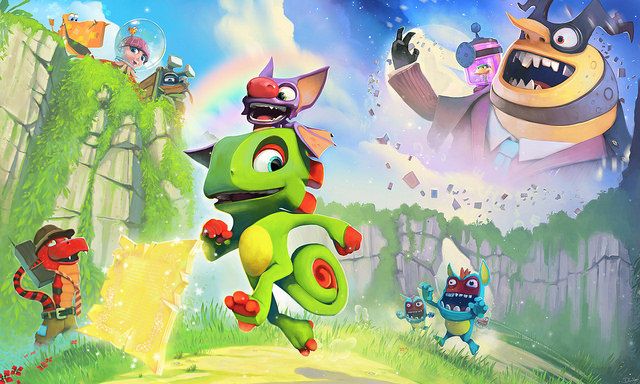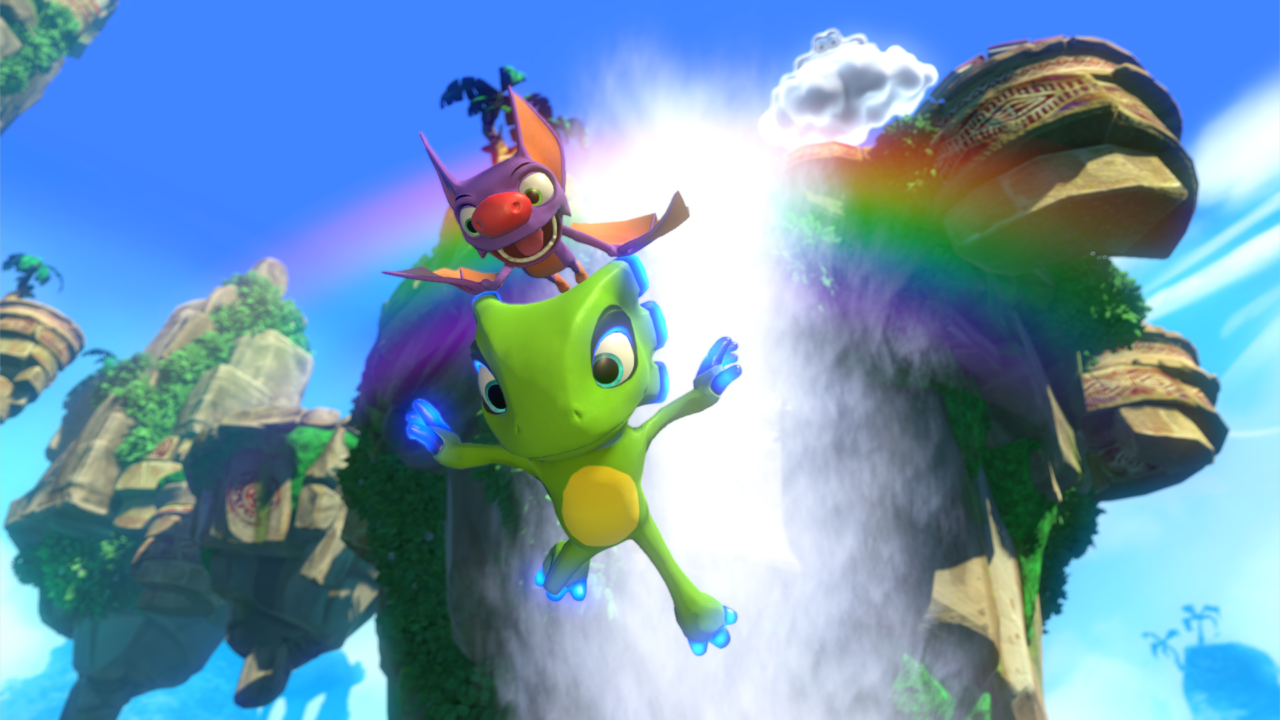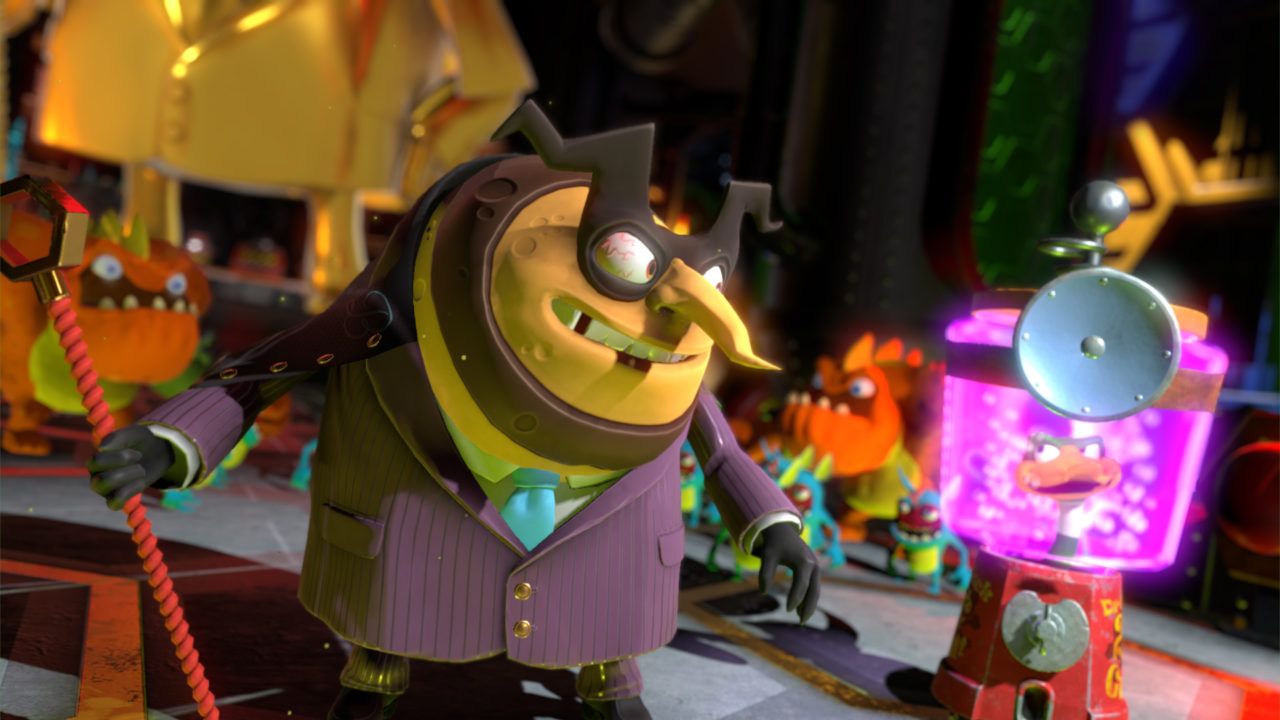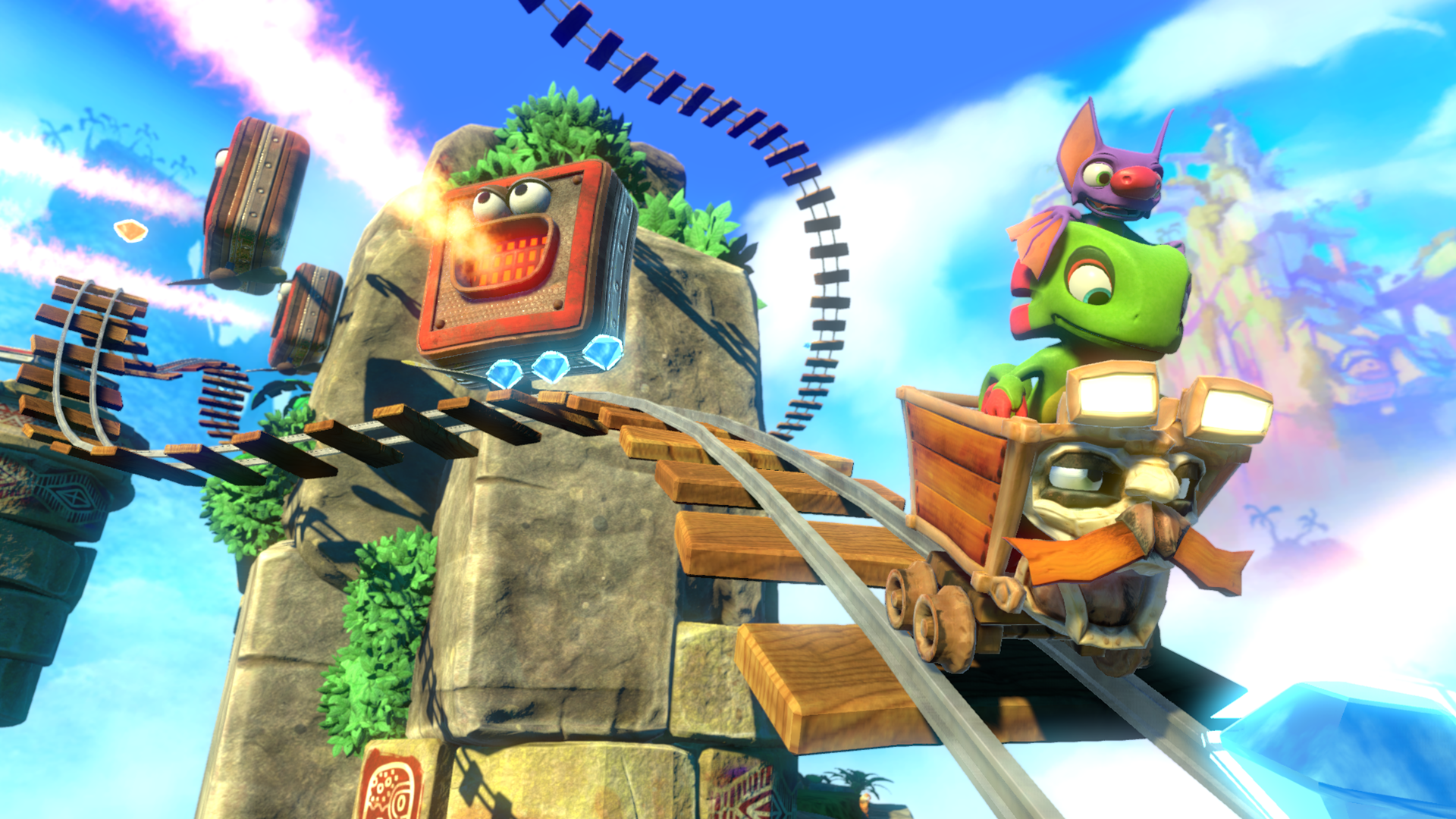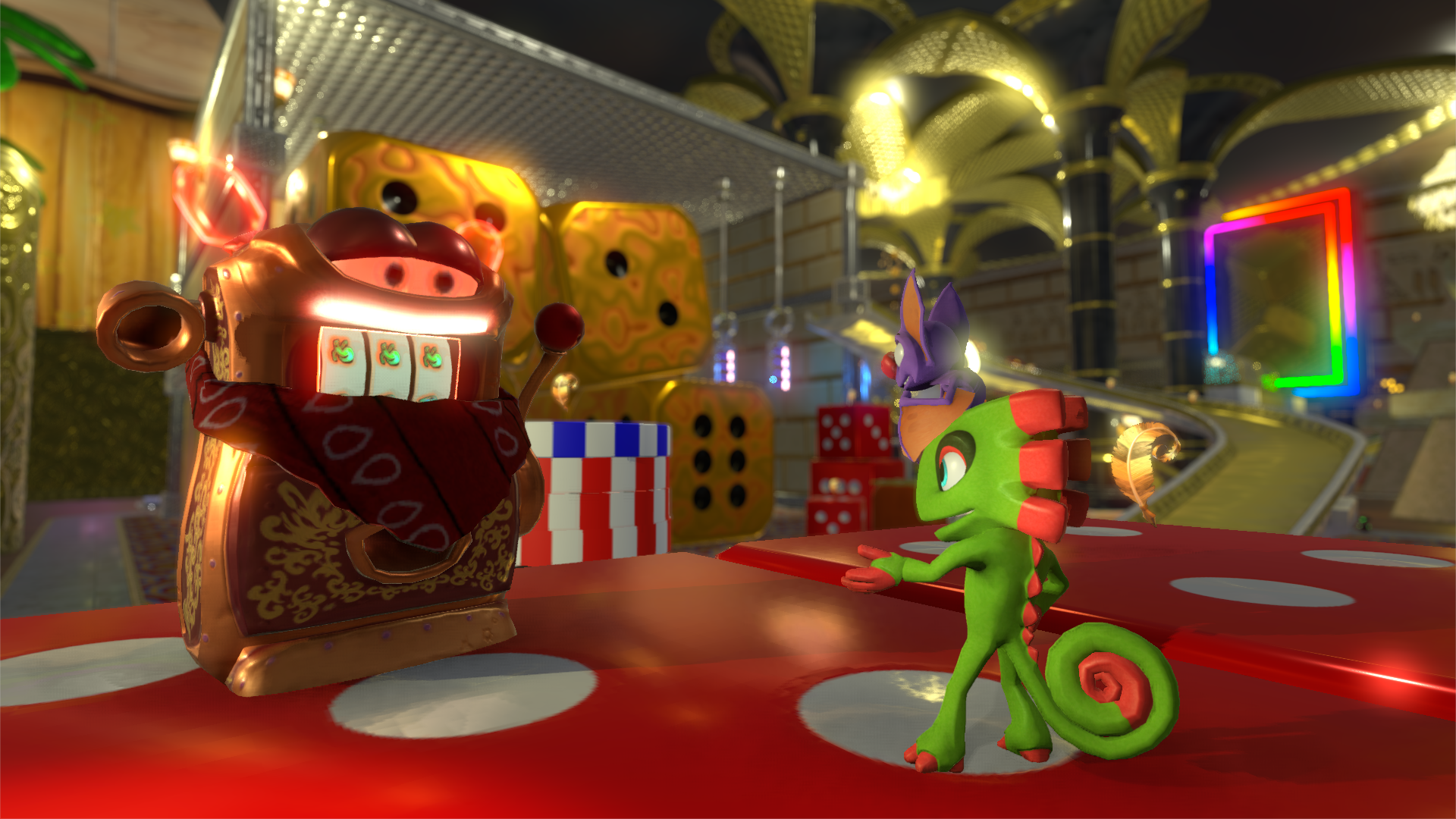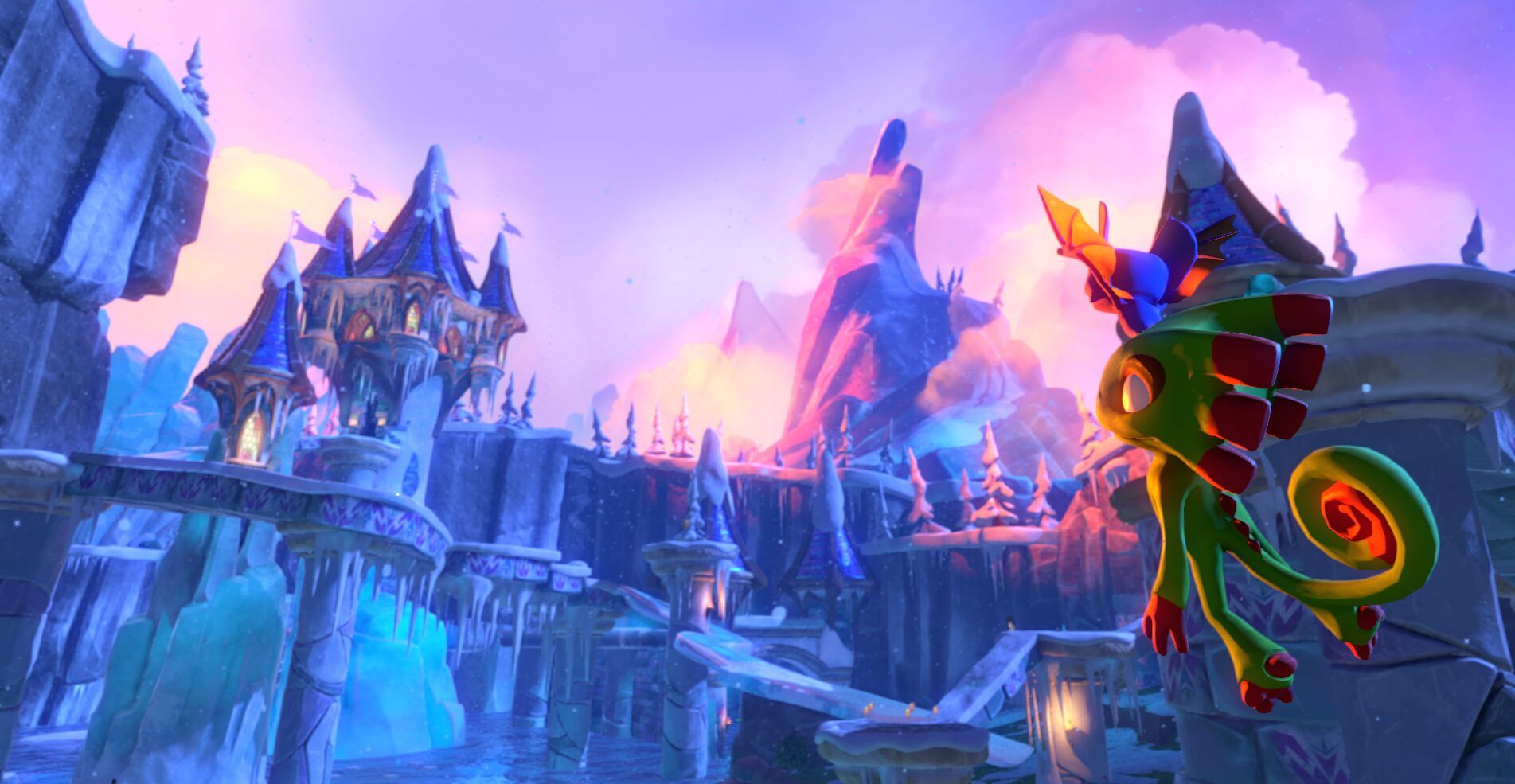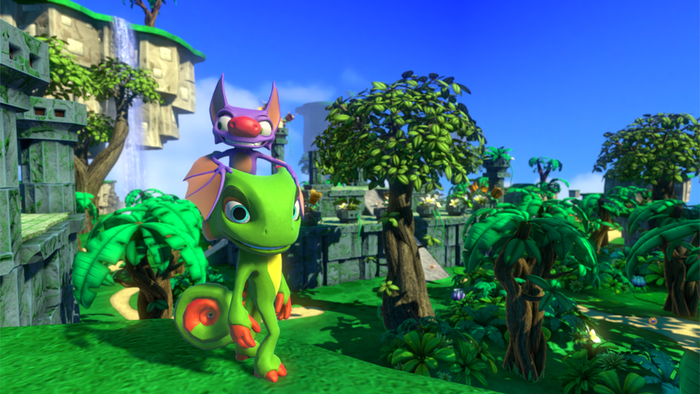Those who are familiar with old platform games from developer Rare are also probably intimately familiar with the music that each of the games boast. Titles like Banjo-Kazooie, Conker's Bad Fur Day, and Donkey Kong Country have long been praised for their scores and have some of the most recognizable tracks in gaming. But as Rare began to make fewer platform games over the years, so with it went the quirky, unique, and lively music from those titles.
Now, Playtonic Games - a studio comprised of almost entirely former developers from Rare - is on the verge of releasing Yooka-Laylee, a new 3D character platformer for a new era. Of course, that means the familiar music of yesteryear will also be accompanying the once old genre into 2017 for an entirely new generation of gamers.
Recently, we were able to talk to former Rare and current Playtonic Games composers Grant Kirkhope, David Wise, and Steve Burke about their work on Yooka-Laylee ahead of the soundtrack's release on April 7.
Yooka-Laylee is out in less than a month and I know that I, for one, am incredibly excited for it. I guess my first question for you all would be how did you initially get involved with the project?
I know that most of Playtonic is comprised of former Rare developers, so I think I have an idea as to how you became involved with the game, but what were those early days of development like and when did you first hear about the project?
Grank Kirkhope: I must admit, I can’t quite remember because I’m just old. [laughs] Like, I had been moaning for this about quite a lot of years and I kept saying that I really thought this was the time for another platform game and it could be a big thing again. No one believed me, and they thought I was talking nonsense. So, it was kind of a happy set of fortunate disasters where some guys left Rare and some guys got laid off. It was the first time where the core Banjo team was available to work on something. We had a kind of secret meeting maybe a year or so prior in a pub - I wasn’t there but the rest of the guys were - in the UK and we kind of got a little thing going on an iPad. A little cube jumping around. It got about that far and then collapsed because they were busy and we all had jobs. There was just no way we could do it. It took the Rare team laying off some key staff, which I thought was a foolish move, but it was good for us. And this was the first time we were really all available.
I always give Gavin Price a lot of credit because he had run a cake business for a few years prior so he had that skill of setting up a business, getting business loans, all of those things that the rest of us were completely useless at. So he [Gavin] said, “Look, Rare is gone. I’m not there anymore, I’m gonna do this.” I was in contact with Gavin very early on, right at the early stages. I had also amassed a reasonable Twitter following at this point, so I thought that I could get this project out to a lot of people. I felt like I had a bit of a mouthpiece to help get us started. So he set the company up, got some business loans, and we had planned on doing the Kickstarter but we didn’t quite know when. Gavin got that all going and that’s how it all kicked off. I was there from the very beginning, really, and then the Kickstarter happened and that was all amazing.
Steve Burke: My first involvement with Yooka-Laylee was to create the sound effects and voices for the Kickstarter video. Grant and Dave are the main composers on the game, and I helped out with nine tracks. This is the first time Grant, Dave, and myself have worked together on a single project; it’s something that we’d wanted to do for a while.
David Wise: Gavin made the initial call - and with a huge amount of encouragement from Grant – saying, "We've got to do this." So we did - and we've done it.
[pullquote]"It took the Rare team laying off some key staff, which I thought was a foolish move, but it was good for us. And this was the first time we were really all available."[/pullquote]
What was it like to work with all of those guys again? I’m sure there was a point in time where you probably thought that wouldn’t happen again, so what was it like to come back and work alongside these people who you know so well?
Grant Kirkhope: Oh, it was terrible. [laughs] No, it was fantastic. I always say that it feels like Banjo-Tooie was yesterday and Yooka-Laylee is today. It seems like that 18 years or whatever it was between games never really ever happened. We’re all just the same idiots that we were back then: the same old jokes, the same old nicknames, the same old name-calling. It hasn’t changed at all from 2000. So that’s been really happy to kind of do all of that all over again. We’re all just older with grayer hair, mortgages, kids, and wives now. So that’s all changed, but everything else is the same.
Steve Burke: I’ve worked with many of the Playtonic peeps before at Rare on Banjo-Kazooie: Nuts & Bolts, Kameo, Jetpac Refuelled, Viva Pinata, and other games. So it was really easy to jump straight in and create the sound effects for the Yooka-Laylee Kickstarter video, and then later the music to Rextro’s Arcade. The way everyone gets on with their own aspect of the game, and sharing ideas and work-in-progress, it was pleasure to work on.
David Wise: It was as though you were going to re-visit your family at Christmas. Where you feel safe, comfortable - and you know you don't have to try too hard to rub along with each other. It was also great to re-visit the 'Rare' development way - and not only appreciate that we can still do it, but that we also have the opportunity to build upon what we have already achieved.
[pullquote]"It was also great to re-visit the 'Rare' development way - and not only appreciate that we can still do it, but that we also have the opportunity to build upon what we have already achieved."[/pullquote]
So once you started working on the project and you began putting your initial tracks together, were you obviously trying recapture a certain mood or tone with from previous games – specifically Banjo-Kazooie – since Yooka-Laylee is a spiritual successor after all?
Grant Kirkhope: It started with the very first piece: that "Jungle" track that was on the Kickstarter video. I was trying to make that piece even more "Banjo-Kazooie" than Banjo-Kazooie. I wanted to get all of those little things that people recognize from my music into the soundtrack. It was especially important with that first track though because I wanted to get the Kickstarter off on the right note – no pun intended. So yeah, that initial goal was to make people realize that it was going to have those initial elements that, hopefully, they liked from the first game.
Going forward, I think we all felt that it would be easy to rest on our laurels and go on autopilot; to just essentially do what we have done before. So, we were all very conscious to not do that. I wanted to make sure that I could hopefully write better music than I did before because I'd hope I’m a better composer now than I was then. Of course, there are no guarantees about that, but I’d like to think that I’m a better composer than I was 20 years ago. [laughs] I think we were just conscious of pushing each other super hard.
For instance, I did a little sort of ice tune for the Kickstarter page. The level hadn’t been created yet, but I wanted to create something else just to give the fans an idea of how things were going to go. So I put together about 30 seconds of a "Freezeezy Peak"-esque music but when the level got built, it was obvious that this wasn’t going to fit. I re-wrote that tune for that level and I’m happy that I did because that’s my favorite piece in the entire game. It’s nice that we can all tell each other that our work is s*** and not get offended.
But yeah, I wanted to make sure that I brought forward all of the warm, cuddly bits from the earlier games: the ones everyone would recognize like the harmonies, and the familiar structure. Then bring that up to date with samples, better music, and then add some new things to it that I’ve learned over the years. So yeah, it’s kind of a mish-mash of what I’ve learned recently and what I learned back then.
Steve Burke: For Rextro’s Arcade I went back to the first video game music that I remember: games from the Commodore 64 and Amiga era. My first drafts of all eight of the Arcade tracks were using low bit synths and drums to capture that sound: really simple sounds such as sine waves and simple synthesis techniques. Each of the arcade tracks are completely different themes, and when I was happy that the tunes were starting to feel right, I then kept those old synth sounds and layered in some orchestra and modern synths. In my sketches folder, I’ve kept the early drafts through to the final versions, and that core retro sound is the foundation of it closely on the style each tune. The space boss fight track I wrote was totally different, and is a big bombastic orchestral track. With theremin.
David Wise: For the mine cart tracks, I based it loosely on a mix of Diddy Kong Racing tracks and Donkey Kong Country mine cart styles. It was more about the pace and feel of movement to help move the experience along.
Okay, so you kind of began touching on it but my next question for you is in regards to the levels, and how you’ve always done music for the specific worlds in these games. Grant, you brought up "Frezeezy Peak" and that was my go-to example. That’s a level from the original Banjo-Kazooie where the music features a lot of instruments like bells and other things that you would normally hear around Christmas or the winter season. You’ve always tried to make the music as identifiable with the world as you can.
What is that kind of process like and what do you have to go off of when creating the tracks for these specific worlds? Is it things like concept art, or do the developers just give you a general idea for what they’re envisioning a certain world to be like?
Grant Kirkhope: I think it’s a bit of all of that, really. You can get to see whatever they have. Like, if they have a level up and running: then you can see that. If they have some concept art: then you can see that. If someone were to ask you to write a desert piece, then I think any composer worth their salt these days already has an idea for a certain instrumentation in mind. As a composer, I feel like you get that in your head straight away before you ever do anything.
For the casino level in Yooka-Laylee, I hadn’t done anything like that before. It was kind of cheesy jazz for a Las Vegas casino coupled with perhaps something that might break into an Ocean’s Eleven type piece midway through. I think you get better at picking up what people want and what they want to hear. With Yooka-Laylee, I felt like I mostly knew what I wanted to do before I started by the description that Gavin or whoever gave me.
You mentioned earlier how your initial track for the ice world, "Glitterglaze Glacier," got cut and you had to redo that piece again. How many revisions do the songs typically go through before you get that final cut of what will actually be in the game?
Grant Kirkhope: With Yooka-Laylee, I’d say not many. I don’t think I re-did anything really, apart from perhaps "Shipwreck Creek." Even then, I kept the same melody to that track and just kind of slowed it down a bit and played around with a few other things, so even that wasn’t a complete change. But yeah, with Yooka-Laylee I don’t think I had to change much of anything.
[pullquote]"Any composer worth their salt these days already has an idea for a certain instrumentation in mind. As a composer, I feel like you get that in your head straight away before you ever do anything."[/pullquote]
The three of you worked together in unison on the soundtrack to this game. How much easier or more difficult is it to work on a project as a unit when compared to working alone? Is it hard to come up with separate ideas while still keeping the game’s tone and mood consistent through your collective work?
Grant Kirkhope: I think when we got together initially and said we were all going to work on the game, it was obvious that the game was in a Banjo-Kazooie-esque fashion so it just made sense that I’d probably write the most because this is more in my ballpark. We’ve all done this for so long that I think we know which parts suit each of us the best in a certain project. It’s nice that we don’t fight over things and we just kind of know which of us will be doing which parts of the game -- which is great. It was obvious from the start which bits would be Dave’s, which bits would be Steve’s, and which bits would be mine.
When we were putting the soundtrack together before Christmas, it was the first time I think we had all of the tracks together in one spot. When we listened to it, we all kind of thought, “God, it really does sound cohesive doesn’t it?” The three of us really hadn’t discussed any themes to the game or anything like that, I guess we all just write in the same style: that kind of general Rare style. It just worked out really great.
Steve Burke: Because each composer had their own area of the game to work on, it was really straightforward for us to get on with our own tunes independently. For me I sent versions of the tracks I was working on to Chris and Gavin at Playtonic, and we’d bounce back ideas and directions until the track was hitting the right vibe. They gave me a lot of space to write what I thought would work best, and that was great because I didn’t feel restricted in what I could do.
David Wise: At Rare we were fiercely competitive, which isn't a bad thing and it's not necessarily a good thing either. We know each other’s strengths and it was great to complement each other’s styles on this project, knowing we were not going to tread on each other’s toes. There's no doubt that Grant is the main influence on the soundtrack, having worked closely with the Playtonic team from Banjo days past.
[pullquote]"At Rare we were fiercely competitive, which isn't a bad thing and it's not necessarily a good thing either. We know each other’s strengths and it was great to complement each other’s styles on this project, knowing we were not going to tread on each other’s toes."[/pullquote]
Grant, I wanted to ask you about the games industry and how it is for composers now. You’ve been around for a while and I wanted to know: do you think it’s harder or easier than it used to be for composers to break into the industry and create music for games?
Grant Kirkhope: I think it’s ridiculously hard: it seems like the new rockstar thing to do. People want to be game composers now, whereas I fell into being a games composer by an absolute accident. I didn’t ever once want to be a composer: I was terrible at harmony, I failed some exams three years out of four. I was dreadful at that stuff. I only got a job at Rare because my friend Robin Beanland - we did Killer Instinct and Conker together - and I played in local bands together in Yorkshire. He got a job at Rare and he had been there for a year when he said to me, “Why don’t you try what I’m doing?” So I said alright. And that was a complete fluke, right?
Now, there’s college courses teaching you how to be a video game or a film composer and you have tons and tons of people who are now coming out of college just wanting to be video game composers. I just think it’s super hard, now. The guys who I know who have been the most successful are the ones who just won’t take "no" for an answer. You’re going to get told “no” a gazillion times, but you only need that one “yes." As a young composer, I think it’s easy to just give up. The hard thing to do is to try and keep going. So how on earth you become a games composer today...I have no idea. I think I’d fail miserably. But I will say that I think it’s important that you network. In a lot of ways, your ability to network is just as important as your ability to compose. It’s the "getting to know people" part of things that might lead to you getting that gig. I know it’s expensive, but go to as many of the conventions like GDC as you can and just try your best.
[pullquote]"You’re going to get told “no” a gazillion times, but you only need that one “yes." As a young composer, I think it’s easy to just give up. The hard thing to do is to try and keep going. So how on earth you become a games composer today...I have no idea. I think I’d fail miserably."[/pullquote]
My final question for you would be that since Laced Records is releasing the Yooka-Laylee soundtrack on CD, vinyl, and digital formats beginning April 7, what’s each of your favorite tracks from the game?
Grant Kirkhope: It is "Glitterglaze Glacier," without a doubt. There’s a bit in the middle when these trombones come in and it’s my little John Williams-esque bit that I tried to emulate because he’s so great. I’m just so pleased that I rewrote that piece because that wasn’t how it was in the first place. Yooka-Laylee has been a complete labor of love for all of us and I had such a good time writing. Let’s just hope it really sells!
Steve Burke: Join them all together in to one epic medley, and I like the whole lot. That first track of Grant’s from the Kickstarter video is absolutely fantastic.
David Wise: My favorite is the ice track from Grant - that's featuring, for good reason, in a lot of the online PR videos for Yooka-Laylee. I also like the Rextro's Arcade themes from Steve. All round - I have to say it's been an absolute pleasure to be able to contribute to the Yooka-Laylee soundtrack and to work with the Playtonic team. Great times indeed!
Yooka-Laylee will release for PS4, Xbox One, PC, Mac, and Linux on April 11th, 2017 - a Nintendo Switch version of the title is also expected later this year.

